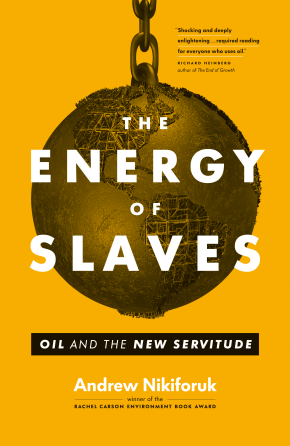By Stewart Seymour (The Cascade) – Email
Print Edition: February 27, 2013
 We are all slave owners. At least, that is the message Andrew Nikiforuk attempts to get across in his book, The Energy Of Slaves. Nikiforuk begins his book discussing our society’s dependence on slaves up until a few hundred years ago. It was the energy of slaves that powered civilizations up to the arrival of oil. Slavery as a consequence of oil would be abolished.
We are all slave owners. At least, that is the message Andrew Nikiforuk attempts to get across in his book, The Energy Of Slaves. Nikiforuk begins his book discussing our society’s dependence on slaves up until a few hundred years ago. It was the energy of slaves that powered civilizations up to the arrival of oil. Slavery as a consequence of oil would be abolished.
Fast forward to today. Every one of us enjoys a lifestyle once reserved for slave masters. The reason? Oil. We are as dependent on oil as slave masters were dependent on slaves. There is one problem – we are running out of oil, and fast. Yet, we continue to live and build in ways that suggest the exact opposite.
The book goes beyond what we already know. We know oil is not here forever. The author is more concerned about our attempts to keep everything going. As a society, we are now going to extraordinary lengths to keep up oil production to meet our energy needs – with oil sands, offshore drilling, fracking and drilling in the arctic. If you think solar or wind energy might be the solution to our energy dependency, see what Nikiforuk has to say. Everything is presented in a comprehensive and thought-provoking way.
The first part of the book is devoted to just how intertwined our lives are with oil. From politics to agriculture to economic growth and our mass consumption of goods – oil makes it possible.
There are lots of statistics to keep you glued. For example, how much energy is in one barrel of oil? If you were to use one cyclist working a regular 40-hour workweek, it would take 7.37 years to match the energy of one barrel of oil. We all love our cars. The average North American devotes 1600 hours a year to their car to drive a distance of 7500 miles. That equates to 4.7 miles an hour. Think how often you are inside your vehicle and it is believable.
The second half of the book devotes itself to discussing possible solutions to our oil dependency and what some of the possible outcomes may be. Although I don’t think the reader will find anything groundbreaking, they will begin to develop the sense that things are much more complicated than we would hope.
The question is not what we are willing to sacrifice, but when.

